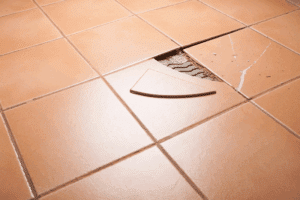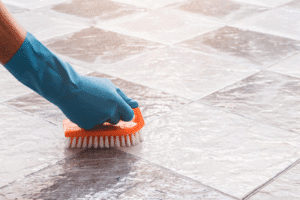Have you been noticing cracks, stains, or loose tiles and wondering if it’s finally time to replace your tile flooring? Many Windsor, CO homeowners put off replacing floors because it feels like a big investment, but waiting too long can lead to bigger problems, like water damage, safety hazards, and costly repairs.
The good news? Knowing the warning signs early can save you time, money, and headaches. In this guide, we’ll walk you through the top 6 signs it’s time to upgrade your tile flooring and restore your home’s beauty and comfort.
6 Signs It’s Time to Replace Your Tile
1. Cracked or Chipped Tiles
Small cracks might seem harmless, but they can quickly spread, allowing moisture to seep underneath. Once water gets into the subfloor, it can cause warping, mold growth, and even structural damage.
In high-traffic areas like kitchens and entryways, cracks often worsen faster due to constant pressure and movement. If you notice new cracks appearing regularly, it’s a sign that the entire floor may be compromised.

2. Persistent Stains That Won’t Go Away
Over time, certain stains, especially from water, rust, or spills, can penetrate tile or grout and become nearly impossible to remove. If scrubbing and deep cleaning aren’t helping, new flooring may be your best option for a fresh, spotless look. Stains in porous grout or unsealed tile can also indicate that moisture has seeped deeper, which may cause further discoloration or odors over time.

3. Loose or Hollow-Sounding Tiles
When you step on a tile and hear a hollow sound or feel it shifting, it’s a sign that the adhesive underneath has failed. This can be caused by moisture, age, or poor installation. Loose tiles aren’t just unattractive; they can also become trip hazards.
If multiple tiles in different areas are loose, it’s usually more cost-effective to replace your tile flooring rather than attempt repeated spot repairs.
4. Outdated Style That No Longer Fits Your Home
Even if your tile is still functional, an outdated color or pattern can make your space feel old. Replacing your tile with a modern design can instantly update the look and increase your home’s value, especially if you’re planning to sell. Today’s tile options offer better durability, slip resistance, and style variety than older materials, making a refresh both practical and aesthetic.
5. Worn or Discolored Grout
Grout is the glue that holds your floor’s appearance together. Over time, it can crack, crumble, or permanently discolor, making the entire floor look aged. If your grout crumbles when touched or has large gaps, it could allow moisture beneath your tiles. Severe grout damage often signals it’s time to replace both the tiles and grout to ensure a lasting, water-tight installation.
6. Water Damage or Mold Concerns
If you’ve had a plumbing leak, flooding, or notice a musty smell, your tile flooring may be hiding water damage or mold. This is more than a cosmetic issue; it can be a serious health risk. Even if the top layer looks fine, water trapped underneath can weaken the subfloor, leading to expensive structural repairs if left untreated.
Repair vs. Replace Your Tile Flooring: Making the Right Choice
Not every issue requires a full flooring overhaul. Use these guidelines to decide:
Choose repair if:
- Only a few tiles are cracked or chipped.
- Grout discoloration is minor and can be cleaned or resealed.
- The floor is still structurally sound and well-adhered.
Choose replacement if:
- Damage is widespread or affects multiple areas.
- Tiles are loose, hollow-sounding, or shifting underfoot.
- Water damage or mold has reached the subfloor.
- The style is outdated and no longer fits your home’s look.
A quick assessment based on these points can help you decide whether to make small fixes or move forward to replace your tile flooring for a lasting solution.
Conclusion
From cracks and stains to loose tiles and water damage, the warning signs that it’s time to replace your tile flooring shouldn’t be ignored. Acting early can prevent bigger issues like structural damage or mold while keeping your home safe and looking its best.
If you’re unsure whether repair or replacement is the smarter choice, reach out to a trusted tile expert who can assess your floors, explain your options, and guide you toward a lasting solution that fits your style and budget.


